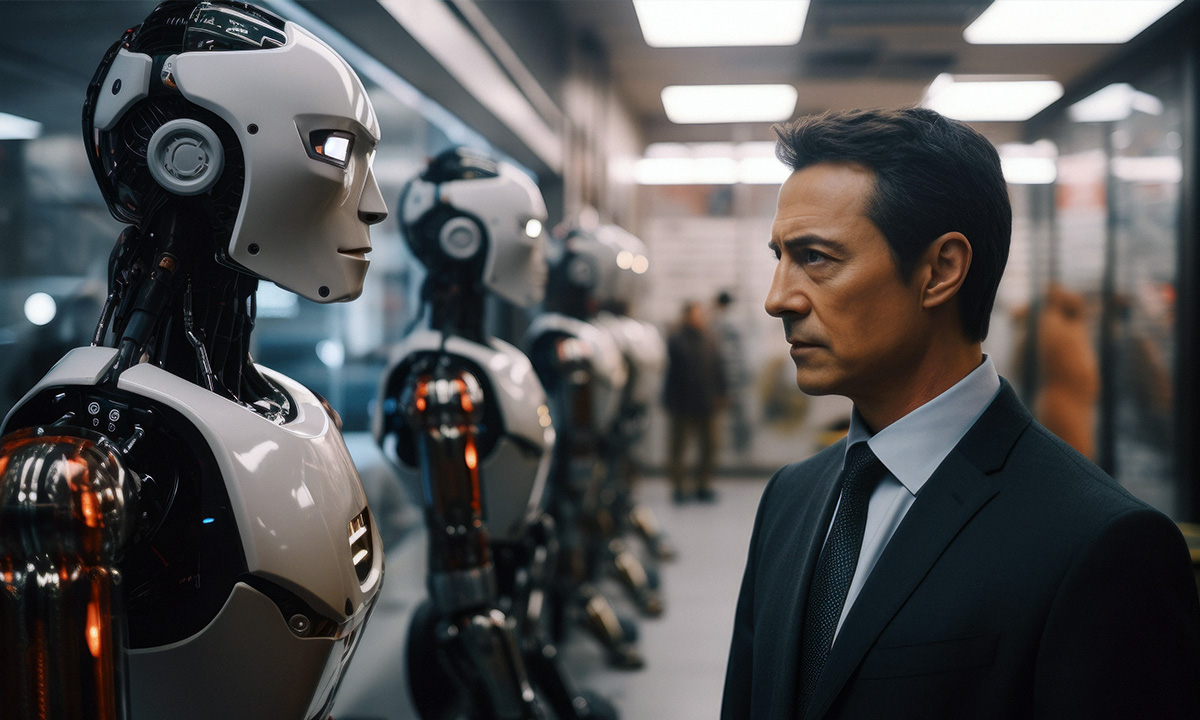Welcome to an exploration of the transformative landscape of Industry 4.0, where innovation and technology converge to redefine the very essence of industrial operations. As we delve into the historical echelons of Industrial Revolutions, dissecting their profound impacts on economies, societies, and politics, we are propelled towards understanding how Industry 4.0 is reshaping our world today.
From smart factories to predictive maintenance and 3D printing, this article navigates through the intricate web of revolutionary changes that have paved the way for a new era of industrial evolution. Join us on this exhilarating journey as we unravel the past, present, and future implications of Industry 4.0 across various countries and industries while anticipating what lies ahead in the dynamic realm of technological advancement.
Exploring the Revolutionary Changes of Industry
The ever-evolving landscape of industry has witnessed transformative shifts through historical Industrial Revolutions, culminating in the disruptive era of Industry 4.0 that continues to redefine traditional paradigms and shape our future.
History of Industrial Revolutions
The history of Industrial Revolutions encompasses significant shifts in economic and social structures: the First, Second, and Third revolutions marked by technological advancements and societal transformations.
First Industrial Revolution
The First Industrial Revolution marked the shift from agrarian to industrial societies in the late 18th century. It introduced mechanization, steam power, and paved the way for mass production.
Second Industrial Revolution
The Second Industrial Revolution, spanning from the late 19th to early 20th century, featured advancements in steel production, electricity, and mass production techniques. It transformed industries and significantly impacted society.
Third Industrial Revolution
The Third Industrial Revolution marked the digital age with advancements in information technology, automation, and renewable energy. It transformed industries worldwide through interconnected systems and sustainable practices.
Characteristics of Industrial Revolutions
Industrial Revolutions are marked by key themes such as technological advancements, increased productivity, and societal transformation. Each revolution has distinctiveness in its components, shaping the industry's evolution.
Key themes
The key themes of industrial revolutions include technological advancements, automation, globalization, and the shift towards knowledge-based economies. These elements shape the transformative nature of industry evolution.
Distinctiveness
The distinctiveness of each industrial revolution lies in its unique technological advancements and societal impacts that set it apart from the previous eras, shaping the course of industry evolution.
Components
The components of Industrial Revolutions include technological advancements, changes in production processes, shifts in workforce skills, and the emergence of new industries.
Industry 4.0
Industry 4.0 encompasses smart factories, predictive maintenance, 3D printing, and smart sensors. It signifies the integration of digital technologies into manufacturing processes for increased efficiency and productivity.
Smart factory
Smart factories integrate advanced technologies like IoT and AI to optimize production processes, increase efficiency, and enhance decision-making capabilities. This innovative approach revolutionizes traditional manufacturing methods.
Predictive maintenance
Predictive maintenance utilizes data analysis to predict equipment failure before it occurs, allowing for timely repairs and preventing costly downtime in industrial operations.
3D printing
3D printing, also known as additive manufacturing, is a process of creating three-dimensional objects layer by layer from digital models. This technology has revolutionized prototyping and production processes in various industries.
Smart sensors
Smart sensors are a pivotal component of Industry 4.0, enabling real-time data collection and analysis in manufacturing processes for increased efficiency and predictive maintenance strategies.
Impacts of Industrial Revolutions
The impacts of Industrial Revolutions are profound, shaping economies, societies, politics, and organizations. Transitioning to a knowledge-based economy has accelerated with far-reaching economic, social, political, and organizational consequences.
Accelerated transition to the knowledge economy
The Industrial Revolutions have propelled a swift shift towards a knowledge-based economy, emphasizing intellectual capital and innovation as key drivers of economic growth.
Economic impact
The Industrial Revolutions have had profound economic impacts, transforming economies globally through increased productivity, innovation, and job creation. From the First to the Fourth Revolution, industries have evolved significantly.
Social impact
The Industrial Revolutions have had profound social impacts, transforming societies through urbanization, changes in work patterns, and shifts in social structures.
Political impact
The Industrial Revolutions have reshaped political landscapes, influencing power dynamics, policies, and global relations. Governments adapt to technological advancements while addressing challenges of governance and international competition.
Organizational impact
The organizational impact of Industrial Revolutions has transformed traditional structures, fostering agile, tech-savvy workplaces. Companies must adapt to digitalization and automation to remain competitive in Industry 4.0.
Country Applications
Countries like Australia, Germany, and India are embracing Industry 4.0 with advancements in automation and digitalization to stay competitive in the global market.
Australia
Australia has embraced Industry 4.0 with advancements in automation and digital technologies, leading to increased productivity and competitiveness in sectors like mining, agriculture, and healthcare.
Germany
Germany has been a pioneering force in embracing Industry 4.0 technologies, leading to increased efficiency and innovation across various sectors of its economy.
Estonia
Estonia, known for its digital advancements, has embraced Industry 4.0 through e-governance initiatives and a proactive approach to implementing innovative technologies in various industries.
Indonesia
Indonesia is embracing Industry 4.0 through initiatives like Making Indonesia 4.0 to enhance digital infrastructure and promote innovation, driving economic growth and competitiveness in the global market.
India
India, with its rapidly growing economy and technology sector, has been actively embracing Industry 4.0 advancements to enhance productivity and competitiveness in various industries.
Japan
Japan has embraced Industry 4.0 with innovations in robotics, AI, and IoT. The country's advanced technology adoption puts it at the forefront of global industrial advancements.
South Africa
South Africa is embracing Industry 4.0 through initiatives like the South African Robotics Olympics and the establishment of smart factories, driving innovation and economic growth in the country.
South Korea
South Korea has embraced Industry 4.0 with initiatives like the Manufacturing Industry Innovation 3.0 Plan, focusing on smart factories and digital transformation for economic growth and competitiveness.
Spain
Spain has embraced Industry 4.0 by investing in technology and innovation across various sectors, positioning itself as a leader in digital transformation within Europe.
Uganda
Uganda is leveraging Industry 4.0 technologies to enhance agricultural productivity and promote economic growth, focusing on digital innovation and smart solutions for sustainable development.
United Kingdom
The United Kingdom has embraced Industry 4.0 through initiatives like the Made Smarter program, focusing on digital technologies to enhance manufacturing efficiency and competitiveness.
United States
The United States has been at the forefront of embracing Industry 4.0 technologies, with a focus on automation, IoT integration, and data analytics across various sectors.
Future Trends and Criticism
As industries evolve, future trends like AI integration and challenges such as cybersecurity concerns are shaping the landscape. Criticism towards Industry 4.0 involves issues of data privacy and job displacement.
Industry applications
Industry applications of Industry 4.0 encompass smart factories, predictive maintenance, 3D printing, and smart sensors to enhance efficiency and productivity in various sectors.
Challenges
The challenges associated with Industry 4.0 include cybersecurity threats, the need for upskilling the workforce, interoperability issues among different technologies, and concerns about data privacy and ethics.
Criticism
Criticism of Industry 4.0 includes concerns about data privacy, job displacement due to automation, and the potential for widening economic inequalities.
Industry 5.0
Industry 5.0 is the next phase in industrial evolution, focusing on human-machine collaboration. It aims to further enhance productivity by integrating advanced technologies with human skills for increased efficiency and innovation.
AI era
The AI era is characterized by the integration of artificial intelligence technologies across industries, revolutionizing processes and decision-making through advanced automation and machine learning algorithms.
Conclusion and Future Outlook
The Industrial Revolutions have played a pivotal role in shaping the world's economies and societies. From mechanization to digitalization, each phase has brought about significant changes in how industries operate and interact with the evolving technological landscape.
Looking ahead, Industry 4.0 continues to revolutionize manufacturing processes by integrating technologies like smart sensors, predictive maintenance, and 3D printing into production systems. This fourth industrial wave emphasizes connectivity, automation, and data exchange to create smarter factories and more efficient supply chains.
As we move towards an AI-driven era with Industry 5.0 on the horizon, it is crucial for businesses and governments to adapt to these rapid technological advancements strategically. Embracing innovation while addressing challenges such as cybersecurity threats and job displacement will be key in ensuring a sustainable future for industries worldwide.
The future outlook remains dynamic as industries navigate through unprecedented shifts propelled by technology. By leveraging the opportunities presented by Industry 4.0 and beyond, organizations can position themselves at the forefront of global competitiveness while fostering economic growth and societal progress in this ever-evolving industrial landscape.
As we navigate through the revolutionary changes of industry, it becomes evident that each industrial revolution has left a lasting impact on economies, societies, and organizations worldwide. The transition to Industry 4.0 has ushered in a new era of smart technologies and digital transformation, paving the way for increased efficiency, productivity, and innovation.
Looking towards the future, Industry 5.0 is on the horizon - an era where humans and machines collaborate more closely than ever before. With advancements in artificial intelligence shaping industries across the globe, there are limitless possibilities for growth and development.
However, as we embrace these future trends and innovations, it's crucial to address challenges such as cybersecurity threats, job displacement due to automation, and ethical considerations surrounding AI implementation. By staying vigilant and proactive in addressing these issues head-on, we can ensure a sustainable and inclusive future for all.
In conclusion...
As we look back on the history of industrial revolutions and explore the transformative changes they have brought, it is evident that each era has reshaped economies, societies, and industries in profound ways. The progression from steam power to smart factories and predictive maintenance showcases the continuous evolution towards greater efficiency and innovation.
The impacts of industrial revolutions have not only accelerated the transition to a knowledge economy but have also led to significant economic, social, political, and organizational changes globally. Countries like Australia, Germany, India, Japan, South Korea are embracing these advancements while facing unique challenges and opportunities tailored to their specific contexts.
Looking ahead at future trends like Industry 5.0 and entering into an AI era presents both exciting possibilities for further growth but also raises important questions about ethics, sustainability, and equality in this rapidly changing landscape. As industries continue to evolve with new technologies and practices emerging every day,
It becomes crucial for businesses, governments, and individuals alike to adapt proactively to stay competitive in this dynamic environment.
The journey of industry revolution is far from over; it is just beginning as we navigate towards a future defined by innovation, collaboration, and sustainable progress.
Together, we can shape a tomorrow where technology serves humanity for the betterment of all. Let's embrace the challenges ahead and usher in a new era
of unprecedented change and endless possibilities.
In this rapidly evolving landscape of industrial revolutions, it is evident that the world is undergoing transformative changes at an unprecedented pace. From the First Industrial Revolution to Industry 4.0 and beyond, each phase has brought about significant advancements in technology, reshaping industries and societies.
As we look towards the future, it is crucial for businesses and governments to adapt to these changes proactively. Embracing digitalization, automation, and artificial intelligence will be key in staying competitive and driving innovation.
While there are challenges and criticisms surrounding these developments, the potential benefits they offer cannot be overlooked. The transition to Industry 5.0 and the AI era holds promise for further advancements that can revolutionize industries across the globe.
By understanding the historical context of industrial revolutions, analyzing their impacts on various aspects of society, and exploring future trends, we can prepare ourselves for what lies ahead in this ever-evolving industry landscape. The key lies in embracing change with a forward-thinking mindset to shape a better future for all stakeholders involved.
The journey through industrial revolutions may have been tumultuous at times, but one thing remains clear – progress waits for no one. It is up to us to seize these opportunities presented by technological advancements and navigate through them strategically as we step into a new era of innovation and growth.
In this fast-paced world, industries are constantly evolving, driven by technological advancements and changing consumer demands. The Industrial Revolutions have shaped our modern society in unprecedented ways, leading to economic growth, social transformation, and political shifts.
As we move into Industry 4.0 and beyond, the integration of smart technologies like AI and IoT will continue to revolutionize how businesses operate. Countries around the globe are embracing these changes at varying paces, with some leading the way in innovation while others are still catching up.
Looking towards the future, industry applications will become increasingly automated and interconnected through AI-driven systems. However, challenges such as cybersecurity threats and job displacement must be addressed to ensure a smooth transition into Industry 5.0.
Despite criticisms surrounding automation's impact on employment opportunities and income inequality, it is clear that industries must adapt to stay competitive in today's digital landscape. As we enter the AI era, collaboration between governments, businesses, and communities will be crucial for shaping a sustainable future for all.
With these transformative changes on the horizon, one thing is certain – industries will continue to evolve at an unprecedented pace as we navigate towards an increasingly interconnected global economy driven by innovation and technology.
As we reflect on the revolutionary changes that industries have undergone throughout history, it's evident that each industrial revolution has significantly shaped the way we live, work, and interact with technology. The advancements in Industry 4.0 have brought about a new era of innovation with smart factories, predictive maintenance, 3D printing, and smart sensors leading the way.
Looking ahead to the future, it's clear that industry applications will continue to evolve rapidly as we enter Industry 5.0 and embrace the AI era. While challenges and criticisms may arise along the way, there is no doubt that these advancements will pave the path for even greater economic growth, social change, and organizational transformation.
As countries like Australia, Germany, India, Japan, and many others strive to stay at the forefront of technological advancements in their industries - there is a shared vision for a more interconnected global economy driven by innovation.

























